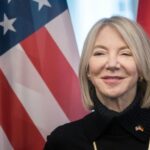
CAIRO (AP) — U.S. President Joe Biden’s administration on Monday imposed sanctions on a Sudanese police unit for using violence against pro-democracy protests that engulfed the African nation following an October military coup.
The Treasury Department said Sudan’s Central Reserve Police, which it described as a militarized unit of the country’s police forces, employed excessive force and was at the forefront of a deadly crackdown on peaceful anti-coup protesters in the capital of Khartoum.
It cited two documented cases of police shooting dead two protesters on January 17 in Khartoum. That day a Sudanese medical group, however, said security forces opened fire on protesters, killing at least seven protesters and wounding around 100 others. It was was one of the of the deadliest days since the coup.
The sanctions include blocking all property or interests in property of the police unit that are within reach of the U.S., according to the Treasury Department.
There was no comment from Sudan’s military rulers.
The Oct. 25 military takeover scuttled hopes of a peaceful transition to democracy after nearly three decades of autocratic rule under President Omar al-Bashir. The coup came more than two years after a popular uprising forced the removal of al-Bashir and his Islamist government in April 2019.
It has triggered near-daily street protests. Security forces launched a deadly crackdown that included firing live ammunition and tear gas at crowds on the streets and knocking the country’s internet and mobile signal offline — all in efforts to keep people from gathering.
Around 90 people, including 15 children, were killed and around 3,000 others injured in the violence since the coup, according to Sudan Doctors Committee, which tracks protester casualties. Most recently, a 17-year-old protester was shot dead Monday in Khartoum’s twin city of Omdurman, the committee said.
“We condemn Sudan’s security services for killing, harassing, and intimidating Sudanese citizens. These actions are exacerbating the crisis in Sudan,” said Under Secretary of the Treasury for Terrorism and Financial Intelligence Brian E. Nelson.
The turmoil has been worsened following the resignation of Prime Minister Abdalla Hamdok earlier this year. Hamdok, who was ousted in the October coup only to be reinstated a month later under heavy international pressure, stepped down on Jan. 2 after his efforts to reach a compromise failed.
Attempts by the U.N. and the U.S. to find a way out of the crippling crisis have so far failed with both sides – the ruling generals and the protest leaders – locked horns.
The pro-democracy protesters call for the establishment of a fully civilian government to complete the now-stalled democratic transition. The generals however insist they will hand over power only to an elected government. They say elections will take place next year.




